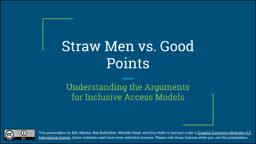
ATTENTION: The works hosted here are being migrated to a new repository that will consolidate resources, improve discoverability, and better show UTA's research impact on the global community. We will update authors as the migration progresses. Please see MavMatrix for more information.
Show simple item record
| dc.contributor.author | Reed, Michelle | |
| dc.contributor.author | Hofer, Amy | |
| dc.contributor.author | Meinke, Billy | |
| dc.contributor.author | Butterfield, Bob | |
| dc.date.accessioned | 2019-04-27T12:33:19Z | |
| dc.date.available | 2019-04-27T12:33:19Z | |
| dc.date.issued | 2018-10-12 | |
| dc.identifier.uri | http://hdl.handle.net/10106/28017 | |
| dc.description.abstract | As the instructional content industry shifts towards rentals and subscription models for textbooks, commercial publishers have refined their marketing pitches aimed at faculty -- sometimes by co-opting arguments in support OER, or by building hype around misleading statements and narrow benefits. This trend is especially evident when they make the case for “inclusive access” models by highlighting how students will have day-one access to the materials, which may seem impressive to those unfamiliar with the immediate access and broad permissions associated with OER. In this session we’ll unpack the talking points and marketing strategies being pushed by commercial publishers in order to separate the straw men from the good points - that is, which arguments are merely distractions and which warrant discussion. We will invite participation from attendees from all sectors. | en_US |
| dc.language.iso | en_US | en_US |
| dc.publisher | The 15th Annual Open Education Conference | en_US |
| dc.subject | publishing | en_US |
| dc.subject | open educational resources | en_US |
| dc.title | Straw Men vs. Good Points: Understanding the Arguments for Inclusive Access Models | en_US |
| dc.type | Presentation | en_US |
Files in this item
- Name:
- StrawMen.pdf
- Size:
- 1.386Mb
- Format:
- PDF
- Description:
- Slides (PDF)
This item appears in the following Collection(s)
Show simple item record


